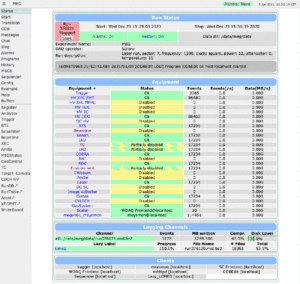Software:Maximum Integrated Data Acquisition System
 | |
 Example web page via mhttpd showing status of an experiment | |
| Developer(s) | Paul Scherrer Institute, TRIUMF |
|---|---|
| Stable release | 2.0.0
/ November 2, 2007 |
| Operating system | Cross-platform |
| Type | Data acquisition |
| License | GPL |
| Website | midas |
MIDAS is a data acquisition package developed at the Paul Scherrer Institute, Switzerland, and TRIUMF, Canada. It was designed for particle detectors using CAMAC and VMEbus hardware.
Description
MIDAS (Maximum Integration Data Acquisition System) has been developed as a general purpose data acquisition system for small and medium scale experiments originally by Stefan Ritt in 1993, followed by Pierre-André Amaudruz in 1996. It is written in C and published under the GPL.
The experiment complexity ranges from test systems, where a single PC is connected to CAMAC via a PC-CAMAC interface, to experiments with several front-end computers and analysis nodes. The system currently runs under Linux, Microsoft Windows, various versions of UNIX, VMS, VxWorks and MS-DOS and can be ported easily to virtually any operating system which supports TCP/IP sockets.
A speed-optimized RPC layer is used for data exchange, with which sustained data rates of 980 kB/s (10BASE-T), 8.7 MB/s (100BASE-TX) and up to 98 MB/s (1000BASE-T). An integrated slow control system contains a fast online database and a history system. Drivers exist for CAMAC, VME, Fastbus, High Voltage Crates, GBIB and several PC plug-in DAQ boards. A framework is supplied which can be extended by user code for front-end readout on one side and data analysis on the other side. The online data can be presented by PAW as histograms and N-tuples as well as by ROOT. A dedicated HTTP server gives fast Web access for experiment control and to access the slow control system including a graphical representation of variable trends (history display).
Usage of MIDAS
MIDAS is used in many experiments in nuclear and particle physics. Following list shows a few of them:
- Mu to E Gamma experiment at PSI
- Mu3e experiment[1] at PSI
- Laboratory for Muon Spin Spectroscopy[2] at PSI
- TWIST experiment at TRIUMF
- Various ISAC experiments[3] at TRIUMF
- T2K experiment in Japan
- DEAP-3600 experiment at SNOLAB
- Muon g-2 experiment at Fermilab
- ASACUSA experiment at CERN
- ALPHA experiment at CERN
References
External links
 |

